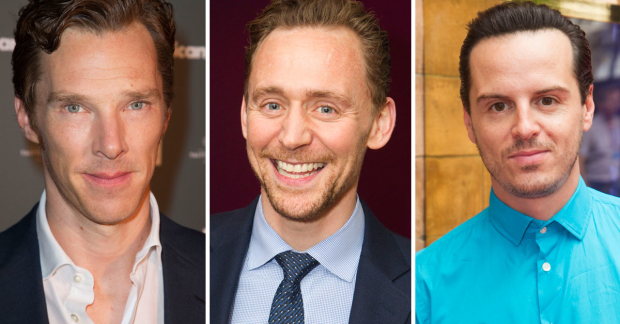Have we had too many Hamlets?
As it’s announced that Tom Hiddleston will step up to take on the role of the Dane, Sarah Crompton asks whether enough is enough

© Dan Wooller for WhatsOnStage
Another day, another Hamlet. The announcement that Kenneth Branagh will direct Tom Hiddleston as Denmark’s sweet prince in a three-week engagement to raise money for RADA means that there will be three Hamlets running in London at the same time.
Hiddleston’s version will be joining Andrew Scott’s luminous Hamlet in Robert Icke‘s sensational production at the Harold Pinter and a stripped down Hamlet at the Park Theatre, starring Gyles Brandreth, his son Benet and his wife Kosha Enger.
The fact that there will be no press tickets gives it a club-like feeling
Hamlet has always been my favourite Shakespeare play and I never tire of seeing new productions of it; but this suddenly feels too much. In the past 18 months, I have been overwhelmed by the power of Scott’s performance but also seen Benedict Cumberbatch and Paapa Essiedu make their mark in the part. I feel I have seen a lot of Hamlet, and that is even though I have missed the Globe’s Hamlet and haven’t yet got to Broadway to see Oscar Isaac put on his cloak of inky black. It is as if Shakespeare only wrote one play.
I applaud the fact that the Hiddleston project is raising money for RADA. Without such fundraising efforts, this brilliant training ground for generations of actors simply cannot function; it already raises half the money it spends in order to ensure that future Kenneth Branaghs (working class boys with no independent means) can continue to have access to such a good start to their profession.
As Hiddleston says: "The performing arts exist to bring people together, not to break or keep them apart. I hope the funds raised by the production will help RADA continue to provide a wider field of equal opportunity to train actors, stage managers and technical theatre artists, from every background, to a standard of excellence and professionalism. We need to keep the doors open for everyone."
I never tire of seeing new productions of it; but this suddenly feels too much
So hurrah for that, and let’s hope it raises as much money as it can. But its admirable function muddies its precise status as a production. Its short run in RADA’s own 160-seat Jerwood Vanburgh Theatre and the fact that there will be no press tickets (why not make us pay top whack instead?) gives it a club-like feeling.
The fact that tickets will be allocated via public ballot and that Hiddleston was quoted as saying "Kenneth Branagh and I have long talked about working on the play together, and now felt like the right time, at the right place" makes it appear like a fully thought-through endeavour. Perhaps it is a bit of both: a trial run at something while two very busy men have the chance that may blossom into something bigger later. Perhaps Hiddleston, at 36, really feels he is running out of time to play Shakespeare’s most popular tragic hero.
Hamlet has always been that. Even in Shakespeare’s own day it was his most performed and most popular play. When Richard Burbage, who originated the title part, died in 1619, his identification with the role was so great that one version of his funeral elegy claimed that there would be "no more young Hamlet".
Shakespeare is bigger than Hamlet
Oh the irony. By the early 20th century, John Dover Wilson, the great Shakespeare scholar, could famously say that "There are as many Hamlets as there are actors that play him" and point to a long line of performers, male and female, to prove his point. You can see why. It’s not just that Hamlet is Shakespeare’s longest and richest play, or that the role is capable – as Simon Russell Beale once told me – "of taking anything that you throw at it".
Hamlet is also simultaneously the most straight-forward and the most complex of heroes; his flaw – if we look at it that way – is hesitation and doubt. He is not violent, like Lear, or tempted to murder his King, like Macbeth, or tricked into murdering his wife like Othello. His tragedy is a modern one of introspection and doubt, not an Elizabethan one of perverted action. No wonder actors line up to mine the infinite possibilities of his thought.
I saw Branagh as a glittering Henry V before I saw him in Hamlet and it was that role-defining Hal that I most remember
Yet I can’t help thinking it is a pity that it has become the go-to choice for proving stage credentials. Hiddleston was previously a wonderfully revealing Coriolanus; his performance illuminated a work that is genuinely difficult, bringing it to a new generation in all its complex wonder. The first time I saw David Tennant in Shakespeare, he was playing Berowne in Love’s Labour’s Lost. He was Hamlet in the same season, and wonderful, but if I had to choose, it would be his performance in the tricky early comedy that I loved best, not least because he suddenly made a play that had always felt fusty and artificial full of humour and heartbreak. I saw Branagh as a glittering Henry V and as a memorably acerbic Benedick in Much Ado before I saw him in Hamlet. He was great in all three, but it was that role-defining Hal that I most remember.
All of which is to say, yes it will be great to see Hiddleston’s Hamlet (should I be lucky in the ballot). But if anytime soon he wants to play Macbeth (I can see his icy edge being an advantage) or have a go at Iago, or Orlando in As You Like It, I’ll be there for that too. Shakespeare is bigger than Hamlet and he needs good actors and great directors to continue to mine and explore all his work if he is to survive for another 400 years.













